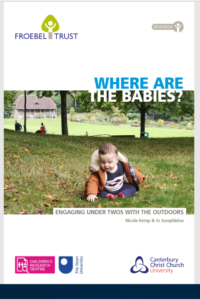Jo Josephidou is Programme lead for Early Childhood at the Open University

One criticism of educational research is that it can be ‘inaccessible in esoteric journals and in opaque language’ (Pring, 2010: 158); if it excludes then the potential impact on practice is hindered. If we want to access as wide an audience as possible for our work, how can we translate it for a variety of readers without dumbing down or watering down?
Accessible E-reports
One practice is to produce an accessible E-report, yet this solution can be problematic. In a recent report, Where are the babies?, my co-author and I struggled to get the language completely right for the diverse range of people possibly interested in the findings. This range included early years practitioners varying in qualifications from level 2 (GCSE) through to postgraduate study, Ofsted or professional networks. The danger of excluding, dumbing down or patronising was very real, and the drafting process took many attempts to get the language ‘just right’. Co-writing added another layer of challenge as my co-author and I found we were making very different assumptions about our imagined reader.
The beauty of the blog
Blogs are also an approved way to disseminate research work. However translating research into a blog post, is a mere first step; you then have to secure a readership. You may spend hours drafting the perfect post only to watch your stats increase by a miserable one or two every day. It’s hard to work out why some posts are more popular than others. Even if you manage to attract a large audience for a particular post, you’re never satisfied. Where are the comments? Where is the passionate debate you were looking to provoke? The beauty of the blog, once you accept you will not change the world with a single post, is that it can be a political act of self-care. You are writing because you have something to say, not because you want to engage in the ego bolstering behaviours that academics may feel under pressure to adopt.
Pleased to meet you!
We need to consider the diverse conversations we could join as academics. These conversations will allow us to share our research in a way that is useful to our audience and useful to us by offering feedback on whether key recommendations do indeed translate into practice. Being introduced to these conversations is dependent on the relationships we can build with interested parties; we benefit from being supported and mentored by those who can facilitate this engagement, remembering to support and mentor others in turn. In our case, introductions to Early Childhood Outdoors and the BERA Nature, Outdoor and Learning SIG gave us the opportunity to present the work at free practitioner seminars like this.
So how do you take an inclusive approach to disseminating your research without feeling you are ‘watering down’ or ‘dumbing down’?

Jo Josephidou is a lecturer in Early Childhood who joined the Open University in September 2019. Her PhD focused on appropriate pedagogies with young children and how practitioner gender may impact on these. Currently, Jo is working collaboratively on a piece of research which focuses on babies’ and toddlers’ opportunities to engage with the outdoor environment and nature. If you would like to read the peer reviewed articles that inform this post, please see:
- Josephidou, J., Kemp, N. and Durrant, I. (2021) ‘Outdoor provision for babies and toddlers: Exploring the practice/policy/research nexus in English ECEC settings’, European Early Childhood Education Research Journal, 29(6).
- Kemp, N. and Josephidou, J. (2021) ‘Babies and toddlers outdoors: a narrative review of the literature on provision for under twos in ECEC settings’, Early Years, DOI: 1080/09575146.2021.1915962
@JoJosephidou